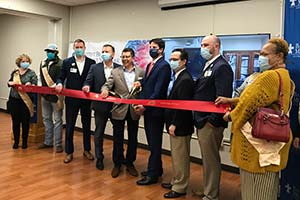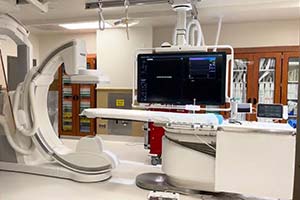New downtown stroke treatment unit to help save more lives
Mar 2, 2022Baptist Medical Center expands access to high-quality stroke treatment with new technology, medical team

Baptist Health System and city leaders helped unveil the new stroke treatment unit at Baptist Medical Center Feb. 28 at a ribbon-cutting ceremony.
(San Antonio, TX) – Every four minutes someone dies from a stroke. Seconds count when it comes to preventing death and disabilities from stroke. That’s why Baptist Medical Center in downtown San Antonio has launched a new stroke treatment unit to help save stroke victims living and working in the booming downtown area and southeast side who require prompt care close to home.
The hospital has hired specialized neuro-interventionalists and neurologists and has invested $3 million in the very latest bi-plane three-dimensional brain imaging technology to provide swift access to the type of care the downtown and southeast side residents need and deserve.
Stroke continues to be the leading cause of disability in the U.S. Currently, there are 3.8 million women and 3 million men living with disabilities as a direct result of stroke. Experts predict that in the coming years, the nation could see an increase in death and disability from strokes as a result of delays in care and unhealthy lifestyles adopted by Americans during the ongoing COVID-19 pandemic.

The hospital has hired specialized neuro-interventionalists and neurologists and has invested $3 million in the very latest bi-plane three-dimensional brain imaging technology (pictured here) to provide swift access to the type of care the downtown and southeast side residents need and deserve.
Anthony Alvarado-Ortiz, D.O., neurologist and medical director of Baptist Health System’s stroke program, said early intervention and swift and precise treatment are directly linked to lower death rates and to reducing brain deficits such as impaired speech, paralysis, blindness and memory loss caused by stroke.
“We are proud to bring this level of care to our downtown and southeast side patients, many of whom suffer from diabetes, high blood pressure, obesity and other ailments that put them at high risk for stroke,” Dr. Alvarado-Ortiz said. “We can now provide them with high-level care in their neighborhood so they don’t have to travel to other parts of town when time is crucial to saving their brain and their lives,” he said.
Baptist Health System’s Brain and Stroke Network medical team, equipped with expertise and the very latest technology, can speed up time-critical triage and transfer decisions and, in some cases, have eliminated brain clots in under 12 minutes. The American Stroke Association recommends that patients receive clot-eliminating therapy in less than 60 minutes from the time they arrive in an ER.
Lana Bamiro, service line administrator for Baptist Health System’s neuroscience program, said the goal is to provide greater access to high-quality care to all residents in San Antonio.
“Baptist Health System is well-positioned to care for patients across the city with our stroke care programs at St. Luke’s Baptist Hospital serving the Medical Center and west side of town, and our program at Northeast Baptist serving the east side of town. Now our new program at Baptist Medical Center will meet the complex stroke care needs of the downtown and southeast side communities,” Bamiro said.
Sources: American Heart Association and American Stroke Association


